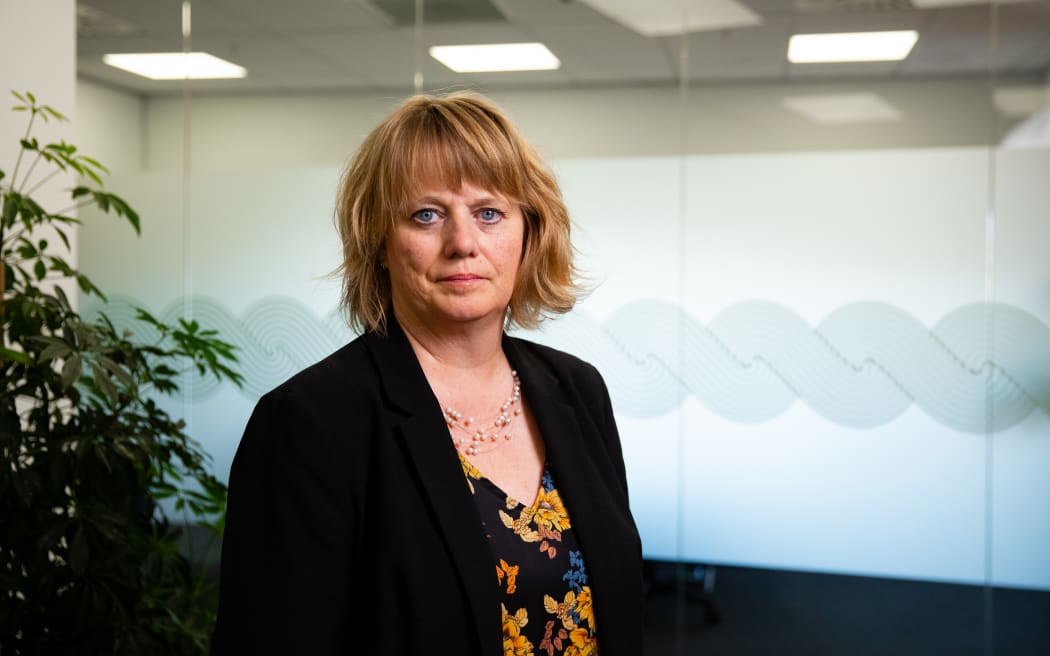
Pharmac chief executive Sarah Fitt says the $1.74b boost gives it "certainty" over funding. Photo: RNZ / LUKE MCPAKE
A multi-million dollar budget boost for Pharmac will only keep the lights on, doctors and patient advocates warn.
The government has today announced the drug-funding agency's budget will top more than $6 billion over the next four years, which it said was needed to fix a shortfall of more than $1.7b left by the last government.
However, Pharmac admitted any new medicines would need an additional cash injection.
- Read more: Pharmac's perpetually stretched budget
Emma Purchase - whose husband Chris died of bowel cancer in 2020 leaving her with a baby and a toddler - said the constant fundraising needed to pay for his treatment added to their stress and grief.
She came to the country's first-ever national medicines summit at Parliament on Monday to tell her story to a hall packed with doctors, sector leaders and the odd politician.
The young widow said a full year of immunotherapy would have cost them $66,000 at a time when they were "penniless".
"When you're as desperate as we were, an extra few pain-free weeks for Chris would have been amazing. An extra year to spend with our children would have seemed like a miracle."
Self-described "medical refugee" Fiona Tolich shifted her entire family to Australia earlier this year to get treatment for the degenerative disease spinal muscular atrophy (SMA).
In December, after years of lobbying, Pharmac agreed to fund the drug Spinraza for all SMA patients under the age of 18 - two years after Australia.
"In the time it took them [Pharmac] from deferring [its decision to fund the drug] to a 'high priority' with the same evidence, we had children with feeding tubes inserted
because they had lost their ability to swallow, we kids who had spinal rod surgery, we had children getting their first power chair because their legs failed them, and we had children who died."
Valuing Life is the name of the two-day conference, co-hosted by Patient Voice Aotearoa and Medicines New Zealand.
But attendees agreed today's funding announcement would not end the Givealittle pages nor people moving to Australia to get the life-saving drugs they needed.
Pharmac chief executive Sarah Fitt said the $1.74b boost over four years would give it "certainty" over its funding.
It allowed it to continue work on continuous glucose monitors (CGMs) for diabetes, and more treatments for people with myeloma - but it would not stretch to new medicines.
"This is very much around funding the medicines we already fund, there is some small allowance for the CGMs and myeloma treatments. Any funding for new medicines will be part of the Budget 24 announcement."
Associate Health Minister David Seymour was unable to say whether the Budget at the end of May would include more money for medicines, including the 15 new cancer treatments to which the coalition had committed.
"Right now we've inherited a fiscal cliff where we have to save the furniture. This is real. Pharmac would have been basically choosing not which new things to fund, but which things people were currently getting that they would have to take away.
"That is completely unacceptable."
The Labour Party said the actual funding gap was $724m and accused Seymour of "glossing over" the billion-dollars in increased costs at Pharmac.
Its health spokesperson, Dr Ayesha Verrall, said the cash injection would not significantly increase access to medicines.
"This is a government that has pledged to remove free prescriptions for New Zealanders.
"Today's talk of fiscal cliffs is merely scapegoating for the funding the government won't deliver because they have prioritised tax cuts over properly funding health," she said.
'Pharmac still very underfunded'
Gastroenterologist Richard Stein, who also chairs Crohn's And Colitis NZ, spearheaded a campaign for better access to medicines for patients that culminated in a march to Parliament in 2020 and a petition signed by 30,000 people.
Stelera was finally funded from February this year for patients for whom other treatments have failed - but he was not hopeful that future funding would keep pace with clinical need.
"I think Pharmac is still very underfunded and I don't expect any increase in the Budget to make any real difference. We need much more than is being promised."
Patient Voice Aotearoa chair Malcolm Mulholland was relieved patients were no longer threatened with losing access to medicines, but he wanted a plan to close the gap with other countries.
"I think it would be unrealistic of me to expect the government to say 'Here's an additional $2.25m, which we know is the shortfall to the OECD average to do that in the next Budget announcement.
"But I would like to see change in the coming years to Pharmac's budget."
Pharmac's incoming chairperson, former National MP Paula Bennett, said she wanted to see "a cultural shift" at the drug-funding agency.
With a couple of weeks yet before her official start, she said she was at the conference "to listen".
"But really I do want to see change.
"I want to see a positive culture that's totally patient-focused, that recognises that it's there to serve New Zealanders and also recognises the changes going on around the world as far as medicines are concerned."







